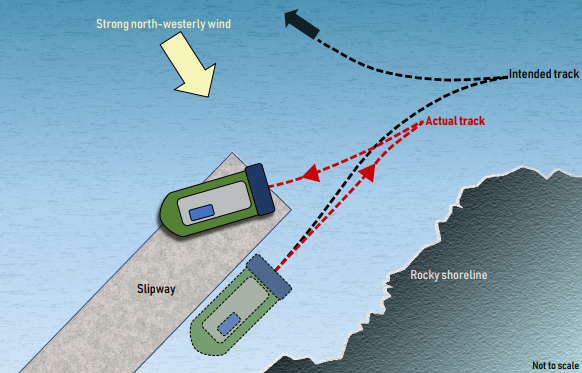In its latest edition of Safety Digest, UK MAIB pays attention to a grounding incident, when a ferry grounded because of high wind conditions; UK MAIB notes that if the skipper had conducted a proper passage plan and was informed of the weather the accident could have been prevented.
The Incident
A small ferry was berthed alongside its slipway, at the western part of a narrow sea passage that usually sailed in several times, on a daily basis. The ferry had to crew and one passenger onboard.
The weather conditions were good, so the crew had visibility. Yet, there was a strong north-westerly wind, gusting up to force 8.
Therefore, in view of the changing weather, the skipper applied astern power and drove the ferry away from the slipway before propelling ahead, intending to turn around to starboard to make the short crossing.
Yet, as the starboard turn began, a strong wind hit the ferry and blew it sideways towards the shore. The skipper then understood that grounding was inevitable, that’s why, they decided to stop propelling. Consequently, the ferry contacted the slipway rather than the adjacent rocky shore.

After the grounding, the skipper called for help via their VHF radio channel 16.
Firstly, two boats that were in close proximity attended the scene, but were unable to approach the vessel in need. In the meantime, the coastguard station, responding to the skipper’s VHF call, sent two lifeboats to assist.
Everyone on board the ferry was safely evacuated ashore and lines were rigged to hold it in place as the tide fell. The grounding occurred 3 hours before low water and the ferry was safety refloated with the assistance of a lifeboat on the rising tide about 6 hours later.
Lessons Learned
- A passage plan is always required, even for short, frequent and repetitive journeys. In this case, a quick assessment of the weather conditions was necessary, in particular the likely effect of the wind needed to be taken into account. Given the strong northwesterly breeze and the sea room available, the skipper could have gone further astern than normal to allow for the wind’s effect. Had the skipper assessed that the situation was not tenable, the crossing could also have been cancelled until the strong wind abated.
- Be ready to act when things start to go wrong. When the skipper realised it was not going to be possible to prevent the grounding, he made a very sensible decision to ensure that the ferry came to rest on the slipway. This minimised the risk of damage to the ferry as it came to rest safely on its keel rather than the rocky shoreline. It also meant that the evacuation was easier to execute.






























































